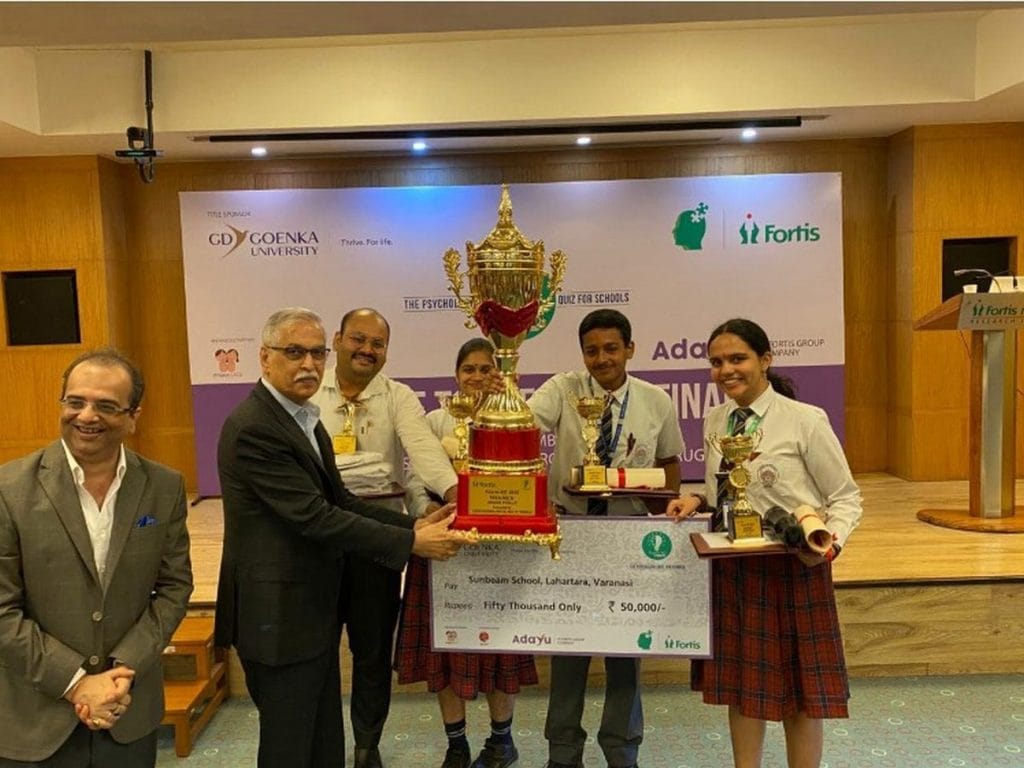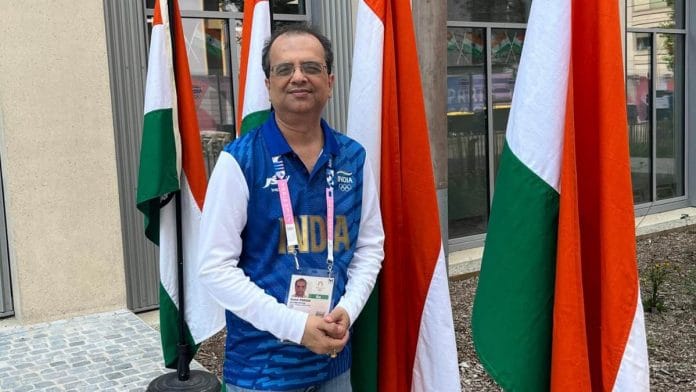Gurugram: He’s travelled to Paris with India’s Olympic team, started a psychology quiz that drew 12,000 schoolchildren this year, bantered with Ranveer Allahabadia on YouTube, held forth on TV panels, and spoken at dozens of TEDx events. The common thread is mental health. Psychiatrist Dr Samir Parikh has made it his business to get India talking about stigma, social media, and the shortage of professionals in the field.
With three decades as a psychiatrist and as the chairperson of the Fortis National Mental Health Program, he’s trying to take the subject into schools, homes, and even online. He’s worried about how Indian youth are now juggling many selves—the real self, the ideal self, the role self, and the digital self.
“I would not have thought a decade back that I would ever talk about the digital self as a separate self,” said Parikh animatedly at the Department of Mental Health and Behavioural Sciences in Fortis Hospital, Gurugram. “It comes with anonymity, with disinhibition, with pressure of comparison, and a lot of incorrect information.”
Mental health is no longer seen as a “first world problem” in India. It found a place in the Union Budget three years ago, when Finance Minister Nirmala Sitharaman said the pandemic had “accentuated mental health problems in people of all ages”. Prime Minister Narendra Modi has spoken about it in several episodes of Mann Ki Baat over the last couple of years and discussed stress in Pariksha Pe Charcha, his annual interaction with students. “Absence of illness does not mean we’re healthy,” he said.
There is also an economic fallout. The World Health Organisation estimates India will lose $1.03 trillion to mental health conditions between 2012 and 2030. A 2023 paper in Cureus noted that up to 15 percent of the population is estimated to suffer from mental illness and that the “prevalence has steadily risen in recent years.”
As the conversation has gained momentum, so has the noise. Influencers and self-styled experts liberally dispense ‘tips’ and pop-psychology jargon on Instagram and YouTube. Parikh wants to cut through that and bring the discussion back to evidence and empathy.
Much of his focus now is on teenagers and their lives online — an area of global concern. In the US, researchers like Jonathan Haidt have linked social media use to rising rates of depression, anxiety and eating disorders. Australia has even instituted a social media ban for children under 16. Parikh has been warning about the same damaging patterns in India.
“There is no substitute for meaningful relationships,” he said. “How many people are on your social media network does not make a difference. How many meaningful relationships you have is what matters.”
He’s found a novel way to get the message across to students. His annual Psych-ED quiz, started in 2016, has become a small phenomenon, with 990 schools participating in its eighth edition this year for prizes of Rs 50,000, Rs 30,000 and Rs 20,000.

This August, Sunbeam School in Varanasi won gold on its third try.
“Samir sir is a really funny person, and Psych-ED is all about having fun,” said Vaibhav Bajaj, a student on the winning team. The team was guided by school counsellor Arpit Tripathi, who said children have shown “great interest” in the subject.
Parikh himself insists he’s still surprised by the scale of the quiz, which began as a simple way to connect with students.
“When I first thought of it, I imagined a run-of-the-mill quiz like the ones in my school days,” he said. “You’d have maybe 15 or 20 schools from Delhi-NCR. We ended up with around 200 schools from 40 or 45 cities.”
In the age of selfies, he added, he doesn’t want to be “narcissistic” by tom-tomming its success.
Also Read: Bengaluru is leading India’s mental health revolution. VCs say it’s the next big field
Psychiatry to Paris and podcasts
Growing up in Delhi, Parikh didn’t begin with a plan to become one of the country’s most visible psychiatrists. When he finished school in 1989, he didn’t even know psychiatry existed as a field. He just knew he wanted to become a doctor and happened to stumble into the field while studying at BJ Medical College in Ahmedabad. He quickly discovered a passion for it.
“My parents were not a hindrance, which is more important. They were supportive of whatever I did. It was a generation which did not know much about psychiatry. But they never questioned my choice.”
He spent the 1990s in Gujarat, completing his MBBS and then an MD in psychiatry, receiving a gold medal for the latter. During his MD, he was mentored by Dr Bharat Panchal, a teacher he still calls his biggest influence.
“I rarely remember my own birthday, but he never forgets to send me books each year,” Parikh said. One of his most abiding lessons from Panchal was that that “if your real self and portrait self [the one displayed to the word] are the same, you will rarely have ethics as a problem”.
He joined Max Healthcare in 2000, heading its Department of Mental Health and Behavioural Sciences for nearly twelve years. In 2012, he moved to Fortis Healthcare as director of the same department. Under his leadership, the Fortis National Mental Health Program has grown into one of the most comprehensive in the country, with a team of 58 that includes psychiatrists, clinical and counselling psychologists, psycho-oncologists, sports psychologists, occupational therapists and art therapists.
In 2024, in what he calls an “important” moment, a mental-health team travelled as part of the medical contingent to the Paris Olympics with Indian athletes. Parikh went as Chief Mental Wellness Expert, along with sports psychologist Divya Jain.
“We are recognising that you can’t have a medical team if you don’t have mental health experts,” he said, crediting the Prime Minister, the Sports Ministry and the Indian Olympic Association for their foresight. “Second, how do you actually have high-level performance without giving mental conditioning and mental support? In fact, at the village, there was something that was called the Mind Zone, an area which was for the mental-health aspect.”
Through it all has been his personal outreach, including a gamut of TEDx talks and interviews on everything from stress and addiction to cannabis use. In June last year, his YouTube appearance with Ranveer Allahabadia, where he spoke about when to visit a doctor and various mental-health issues, got nearly 9 lakh views and more than 1,000 comments. Allahabadia introduced him as someone who’d been “speaking about mental health before it was cool.”
“This is a much-needed conversation… Our society is doomed if something is not done,” said one commenter.
For the stubbornly modest Parikh, his efforts are a “speck of sand in the vast, vast desert that is the neglect of mental health in society.” But many in the field credit him for taking the conversation out of academic silos, while also adding an authoritative voice to the popular discourse.
“Psychology and the mental-health space in India lack a representative, a communicator to take forward the conversation. A lot of information comes in the form of ‘pop psychology’, which lacks nuance and depth. Dr Parikh has the expertise to start that dialogue,” said Ankita, a third-year psychology student at Gargi College, Delhi, who attended one of his online lectures in her first year.
Also Read: Everyone’s a therapist in India—influencers, dentists, homeopaths. It’s the new epidemic
New minds, new methods
Whether it’s the Psych-Ed quiz or school workshops, one of Parikh’s missions is to help nurture the next generation of mental-health professionals. The WHO recommends at least 1.7 psychiatrists for every 100,000 people. In India, there are only about 0.75.
Catching them young, he says, is one way to start filling the gap—through classrooms, curiosity, and even competitions.
“We were working with schools in trying to build awareness and skill sets,” he said. “And that’s when these thoughts started trickling in… we thought, let’s do something fun.”
Psych-ED, in that sense, is as much about firing up the imagination as it is about taking home a trophy.
“The idea is that psychology students should be able to enjoy the subject. It could be a syndrome here, a social psychology experiment there. The mere fact that you’re sketching answers or hitting a buzzer adds fun — and you tend to remember things better when your mind is open and you’re having some enjoyment,” he added.
Parikh hopes such efforts will help more young people see psychology as a viable career. More than the government, he wants to see greater initiative from the healthcare and corporate sectors to build awareness and infrastructure from the ground up.
“We do have a significant shortage of psychological experts in our country. That’s a fact,” he said. “How will that change? That will change when more people take the branch early, when there are more graduate and postgraduate seats, and when it becomes a viable vocation for people.”
He’s now trying to take mental health to places and formats that haven’t seen much attention yet.
One such initiative is Adayu, Fortis Healthcare’s first in-patient, dedicated psychiatry hospital in Gurugram, which is due to be ready next month.
He’s also collaborating with Virtuleap, a company based in Portugal, to bring Virtual Reality Cognitive Therapy (VRCT) to India. The technology immerses patients in virtual settings where their avatars interact with digital characters. The games are a tool that may strengthen areas of the brain affected by conditions such as ADHD, depression, and cognitive decline.
“You look at societal safety, it’s about our mental health. You look at prosperity, it’s about mental health. You look at relationships, it’s about mental health,” he said. “It’s impossible to have a flourishing society in the absence of the right kind of mental health.”
Priyanka Mehta is an alumna of ThePrint School of Journalism (Batch 3).
(Edited by Asavari Singh)






